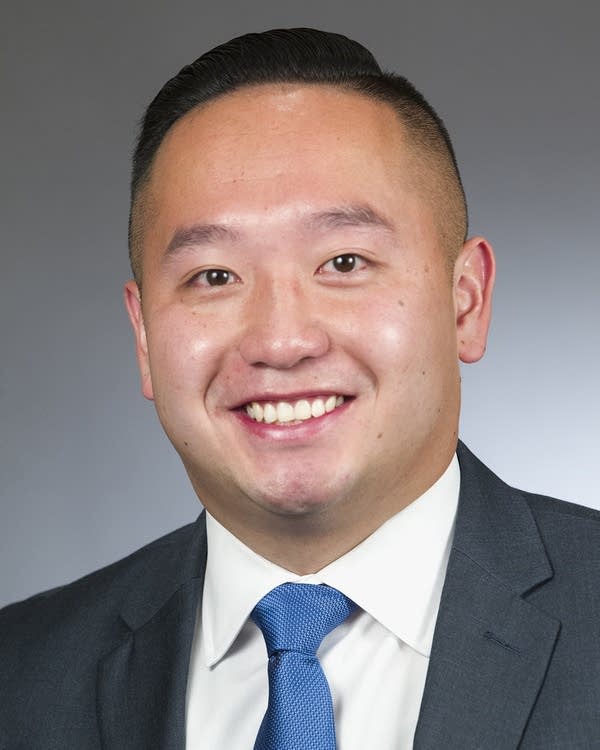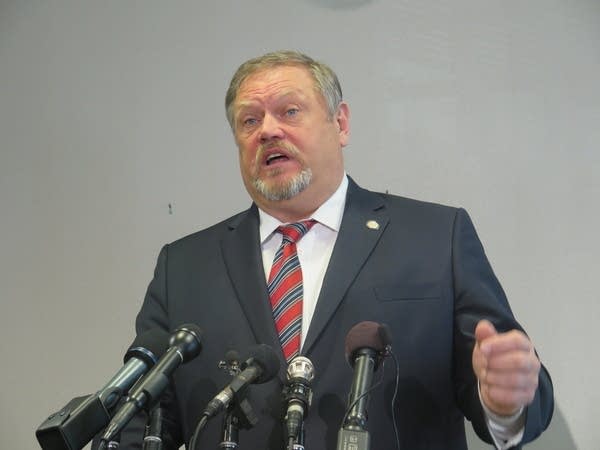Surplus steals show, but borrowing plan still in Capitol mix

Go Deeper.
Create an account or log in to save stories.
Like this?
Thanks for liking this story! We have added it to a list of your favorite stories.
In more-normal times, a construction borrowing package known as the bonding bill would be the main priority of state lawmakers in their election-year session.
But Minnesota has that giant budget surplus for lawmakers to divvy up this session — estimated at more than $9 billion just a couple of weeks back. Debate over what to do with that projected surplus is dominant right now and could shape discussion around the bonding bill, too.
The usual buildup around what a public works bill might contain and discussion over how big a plan should be has been largely overshadowed.
The Senate Capital Investment Committee hasn’t even held a hearing yet in 2022 although it also did an extensive tour of 170 projects over the interim between last session and this one.
Turn Up Your Support
MPR News helps you turn down the noise and build shared understanding. Turn up your support for this public resource and keep trusted journalism accessible to all.

The House Capital Investment Committee has met about a dozen times this session to hear pitches from community leaders and state agencies about what they want. But Committee Chair Fue Lee, DFL-Minneapolis, said release of a comprehensive bonding proposal is still several weeks away and might not be unveiled until after the Legislature’s spring recess in mid-April.
The pile of proposals lawmakers are sorting through is quite tall. About 450 bills have been routed to Lee’s committee, most of them attached to a particular project.
His committee also went on a statewide tour last year to visit 243 proposed projects. It logged some 2,400 miles.
“We've been working on identifying these different needs across the entire state whether that's in blue districts or red districts. And we saw through the summer with all these different requests for capital investment dollars, $5.4 billion,” Lee said. “And for us to really address these critical infrastructure needs, we all need to come together and really solve what we can do to help our communities across the state that really need our help.”
Lee said he expects his bill’s emphasis to be on affordable housing, projects with a climate-change impact and those that help foster racial equity.
Senate Capital Investment Committee Chair Tom Bakk, a Republican-aligned independent from Cook, said his plan will probably concentrate on wastewater facilities, transportation, college building rehabilitations, public safety projects and other deferred maintenance.
“I don't want to use the word milquetoast, but it'll be a pretty basic bill largely,” Bakk said.

The final bill won’t be anywhere near the $5 billion-plus in requests. DFL Gov. Tim Walz proposed taking on $2 billion in general debt and using $700 million from other sources to support his recommended project list.
Legislative Republicans, who hold the state Senate majority, have said they’re not inclined to go that high. The House GOP also has a big say because this is the one bill where minority support is essential because it takes a three-fifths majority to approve it; Minority Leader Kurt Daudt, R-Zimmerman, said DFLers will need to include him in the negotiations to land at least 11 required votes from his side.
“Why don’t we authorize what we’re ready to [construct] and what our actual capacity is to get the work done and not overextend ourselves,” Daudt said in a forum last month. “And let’s not politicize it by saying ‘I outbid you.’”
Minnesota lawmakers approved a $1.9 billion bonding package in 2020. The Department of Minnesota Management and Budget estimates that there are almost $2.8 billion in authorized project bonds that have yet to be issued from prior years. Most of that is in the form of highway bonds that are sold as projects are closer to the start of construction.
The surplus could also be a crucial factor in the debate.
Generally speaking, the borrowing bill is for things with a long-term benefit so the idea is to pay it off over time. It’s akin to that 30-year mortgage you take out to buy a house.
But the Legislature could opt to pay cash for more things than usual this year.
Bakk said he’s going to try to keep cash spent on projects to a minimum.
“There’s a reason we bond. It’s so that future taxpayers pay part of the cost of investments in public infrastructure,” Bakk said. “Why would we use cash to build a bridge and then future taxpayers make zero contribution to the cost of it?”
There’s also the tie-in to the new federal infrastructure plan. Some of that requires state or local matching dollars to unlock the full amount for road projects, wastewater upgrades or lead pipe replacement.
In fact, lawmakers are likely to approve some money this year to do a lead service pipe inventory. That’s seen as key to leveraging federal money to replace those pipes in the years to come.
Bakk and Lee have already had preliminary talks. Lee said it was “just laying the foundation” about how to work through the eventual bonding bill negotiations. Bakk said he also wants to make sure a construction projects bill doesn’t get lost in the end-of-session shuffle.
“I don't know why it has to be kind of the last bill out of town,” Bakk said. “But it just kind of historically has been.”


